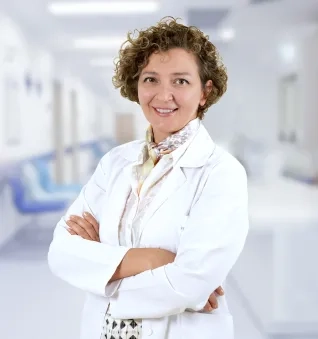Alo Yeditepe
Alo Yeditepe
Breakthrough Innovations in Colon Cancer
Colon cancer, which is among the preventable cancers, seems to have regressed a little thanks to screening programs. Yeditepe University Koşuyolu Hospital Gastroenterology Specialist Prof. Dr. Cengiz Pata states that it has moved from the 2nd to the 3rd place among the most common cancers in the USA, and explains that this development reveals the importance of regular follow-up and screening programs for risky groups. He says that especially the new developments in recent years have been a breakthrough in this sense.
Colon cancer is one of the cancers where screening programs save lives. Especially for those with a family history of cancer. While the studies on the subject continue, the information obtained also changes the approach to colon cancer. Prof. Dr. Cengiz Pata underlines that genetic tests and new-generation diagnostic technology are extremely important for both patients and physicians.
Age Is Brought Forward for Screening Tests
Prof. Dr. Cengiz Pata, who said that the standard screening age has decreased from the age of 50 to 45 nowadays, as colon cancer has started to be encountered more frequently and at younger ages, gave the following information: “Colon cancer has started to be seen more frequently even in the ages of 30-35 compared to the past. The standard screening was every 10 years after the age of 50. More specialized screening programs were available for high-risk groups. But today that knowledge has also changed. I must also say that there are such types of cancer that no matter how much we screen (about 2-5%), cancer can be seen in the normally observed intestine after 2 years. In this case, having regular colonoscopy follow-ups does not mean that you will definitely not get cancer. However, regular screening should still be done in high-risk groups.”
There Are New Approaches in High-Risk Group
Colon cancer is one of the cancers in which heredity is effective. For this reason, people with a first-degree relative having colon cancer are considered a high-risk group. Stating that there are new approaches for the people in this group, Prof. Dr. Cengiz Pata said, “In colon cancer, as in many cancers today, genetic counseling can determine the risk of the person, and screening programs can be planned accordingly. There are close to 30 genes identified related to colon cancer. Separating them according to the differences between them is a process that requires genetic expertise. These services have become very widespread abroad, and they are just beginning to be used in our country.”
Stating that genetic counseling has opened a very important page in colon cancer, Prof. Dr. Cengiz Pata said, “Lynch Syndrome", which constitutes about 1 percent of colon cancers, is a good example in this regard. We follow up with such risky people whose first-degree relatives have had colon cancer under the age of 40 for two generations, with colonoscopy every 2 years, starting 10 years before the youngest case. The new approach for these cases is that it can be determined whether this gene is present by detecting the disease gene in those who are sick and screening those at risk. We include people who do not carry the gene in standard screening programs. Therefore, people with first-degree relatives having colon cancer should receive genetic counseling from adulthood without an age limit. Important developments are taking place in our country in this regard.”
Prof. Dr. Cengiz Pata explained that it is not necessary to increase the screening programs of people who do not fit into the genetic risk group as a result of genetic counseling, and gave the following information on the subject: “We reduce the screening frequency from 10 to 5 years for those found at high risk. However, if, for example, the person's 30-year-old sibling has been diagnosed with bowel cancer, this person should undergo a colonoscopy every 10 years starting from the age of 20. However, if the cancer gene is not detected after genetic counseling, it is not possible to return to the normal screening procedure. In other words, it is possible to start having a colonoscopy at the age of 45, not at the age of 20.”
There Are Also New Developments in Diagnosis
Reminding that there are innovations in this regard besides the fecal occult blood test used in the diagnosis of colon cancer, Yeditepe University Hospital Gastroenterology Specialist Prof. Dr. Cengiz Pata said, “Tests based on protein measurement in stool are very new. For this reason, it is not widely used yet, but it will take its place in diagnosis in the coming years. Another innovation in diagnostic methods is the “Video Capsule Colonoscopy.” In fact, although it is not a difficult procedure, some people may hesitate to have a colonoscopy. At this point, capsule colonoscopy provides great convenience. The patient swallows this special device, which is about the size of a bean and contains two cameras. The images obtained by the camera are transferred to a mobile phone-sized computer in your waist during the journey of the capsule through the intestines. The diagnostic sensitivity of the new generation capsules is approximately 90-95%.”
Press Coverage: | hurriyetaile.com | cnnturk.com | ntv.com.tr | mynet.com
About
Faculty and Year of Graduation:
Hacettepe University Faculty of Medicine, 1993
”
See Also
- What is a Liver Transplant, How is it Done? and Who is it For?
- What is Constipation? What Helps With Constipation?
- What is Hepatitis B? What are its symptoms? How is it Transmitted?
- How to Cleanse the Liver the Fastest?
- Who Gets Colon Cancer?
- What is Colostrum? What are the Benefits of Colostrum Milk?
- Stomach Cancer Causes, Symptoms and Treatment
- What is Colon (Intestinal) Cancer? Symptoms and Treatment
- What Causes Nausea? What is Good for Nausea?
- What is Heartburn? What is Good for Heartburn?
- What is Fatty Liver?
- What is Good for Diarrhea? How to Treat Diarrhea?
- What is a Probiotic? What Are Its Benefits?
- What Is Reflux?
- Non-Surgical Treatment of Reflux
- What are the Nutrients That Stress Digestion?
- What are Capsule Treatment Methods in Stomach, Small, and Large Intestine Screening?
- Gastroenterology Procedures
- Pay Attention When Consuming These Nutrients!
- Mediterranean Diet Prevents Developing Colon Cancer!
- Diarrhea and Constipation Increased in Those with Irritable Stomach
- I Was Waking Up With Stomach Pain, I Fell Better After Endoscopic Fundoplication
- Anemia, Constipation, and Vomiting of Unknown Cause Can Be Dangerous
- As the Western Diet Increases, So Does Stomach Cancer
- Ramadan Warning for Those Who Experience Stomach Disorders
- Causes and Treatment of Abdominal Bloating
- Hepatitis Disease Poses Risk for Esophageal Varices
- The Giant Stones In The Biliary Tract Of 71-Year-Old Patient Were Removed Without Surgery
- How Is Stomach Infection Transmitted?
- What is Gastroesophageal Reflux Disease?
- Capsule Endoscopy
- Stretta / Endoscopic Reflux Treatment
- Fundoplication Method / Endoscopic Reflux Treatment
- Throat Reflux
- Techniques and Applications Used in Gastroenterology
- Irritable Bowel Syndrome (IBS)
- How to Swallow the Drug?
- Non-Surgical Reflux Treatment
Alo Yeditepe






